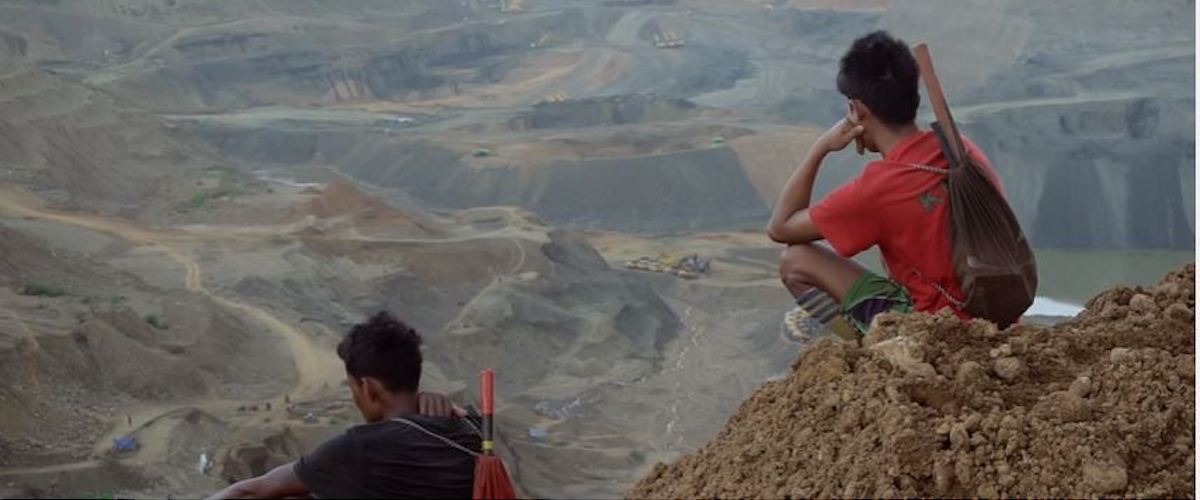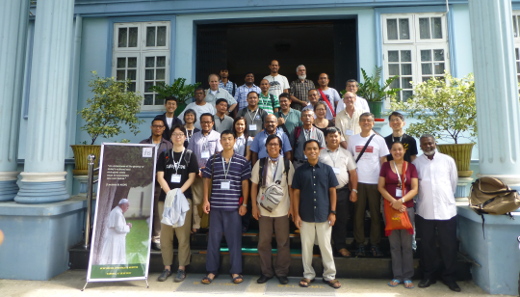
From the documentary “Jade and the Generals”. Jade mining has caused Myanmar’s mountains to disappear and become valleys.
“You name it – we have it. Jade, gold, gas, rivers, teak … But this nation is like a blind beggar begging with a golden plate.” With these words, Charles Cardinal Bo, Archbishop of Yangon, set the stage for the four-day Social Apostolate meeting of the Jesuit Conference of Asia Pacific.
The picture drawn by Cardinal Bo in his keynote address was eye-opening for many of the 38 delegates and it made clear the need for reconciliation and justice in natural resource management, the theme of the meeting.
“This generation alone Myanmar lost huge forest coverage, last year 32 billion worth of jade was mined and sold with no benefit to our poor children. Within 10 years the jade mountains will disappear, filling the secret bank accounts of some companies,” he declared.
A video produced by Global Witness titled “Jade and the Generals” reinforced the Cardinal’s point with its stark images of the devastation to land and livelihood caused by the jade mining industry.
What can and is being done to address what Cardinal Bo calls Myanmar’s “resource curse”?

Many were inspired especially by Khon Ja, a social activist who coordinates the Kachin Peace Network, who spoke passionately about the struggles of her people and other ethnic groups. She asked three things of the Jesuits – continue to raise awareness and educate church leaders, provide exposure to the issues faced by indigenous communities and accompany ethnic groups in their struggles, creating space and enabling environments.
As Cardinal Bo reminded everyone, “In our Catholic tradition we always say ‘ If you want peace work for Justice’.”
Fr Xavier Jeyaraj SJ, Social Justice and Ecology Secretary in Rome, underlined that the development of a Christian and a Jesuit environmental ethic and reconciling with creation requires a transition in faith and an approach, not just a mental exercise.
“From a faith perspective, we need to acknowledge the suffering we have caused, change our attitudes and become agents of change,” he said.

At the start of the meeting, JCAP President Fr Mark Raper SJ had asked the delegates to commit to action and focus on follow-up and evaluation. They took his words to heart and returned home with commitments to a range of collaborative actions. These include reducing energy use and waste, and increasing recycling across Jesuit communities, supporting micro-finance and eco-finance initiatives, implementing sustainable agriculture approaches, learning from each other about ways of working with and empowering indigenous peoples, studying the impact of mining companies in the region, supporting forest communities, and raising awareness of the need for natural resource management.
As Garry Roach of Jesuit Social Services in Australia, shared, “In Laudato si’, Pope Francis critiques consumerism and irresponsible development, laments environmental degradation and global warming, and calls all people of the world to take ‘swift and unified global action’. The Myanmar gathering offered us the opportunity to reflect on the messages of Laudato si’ and take steps to live out the encyclical in our communities and social apostolates.”






